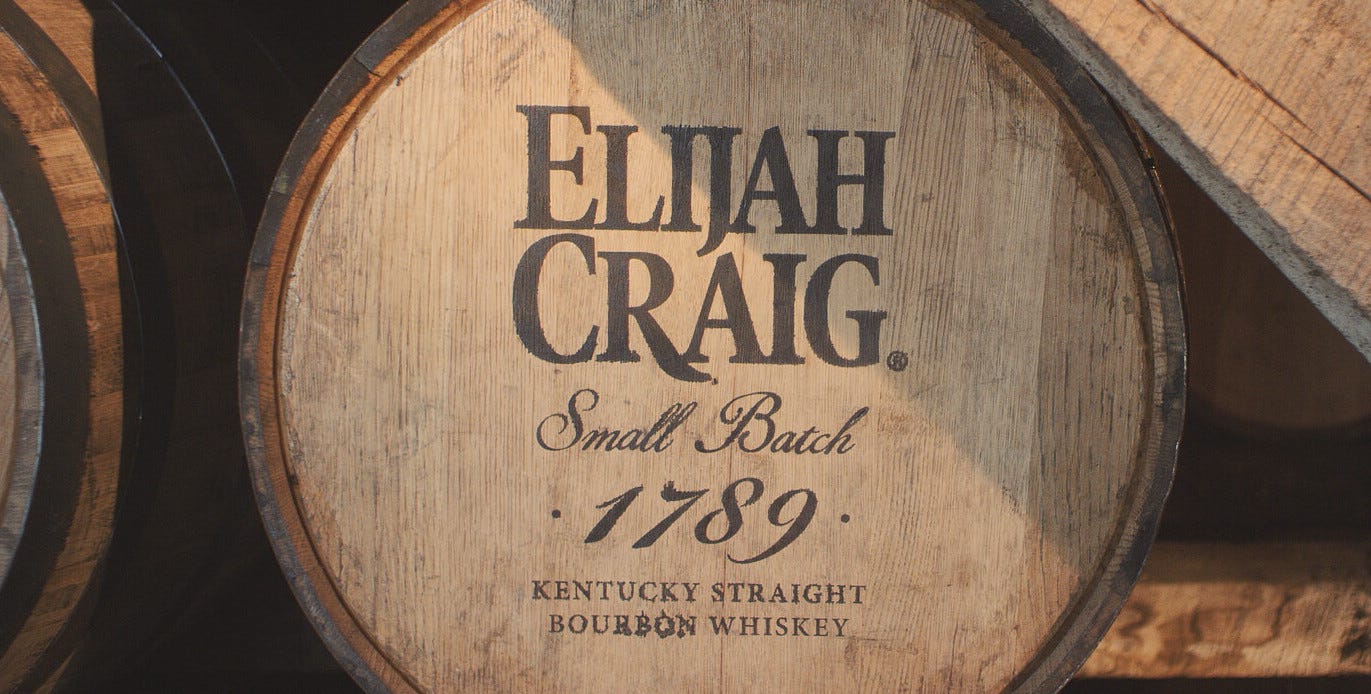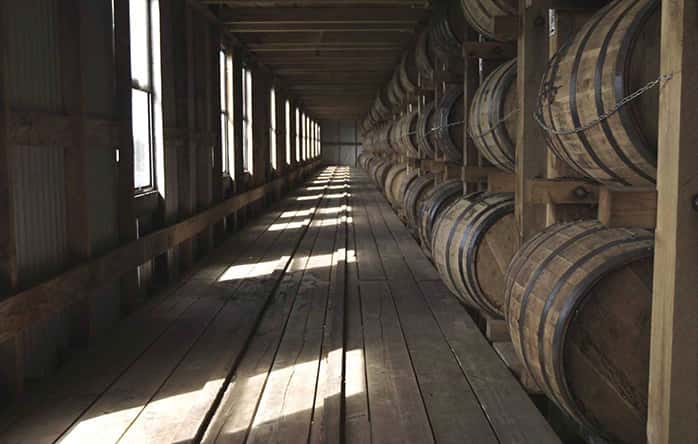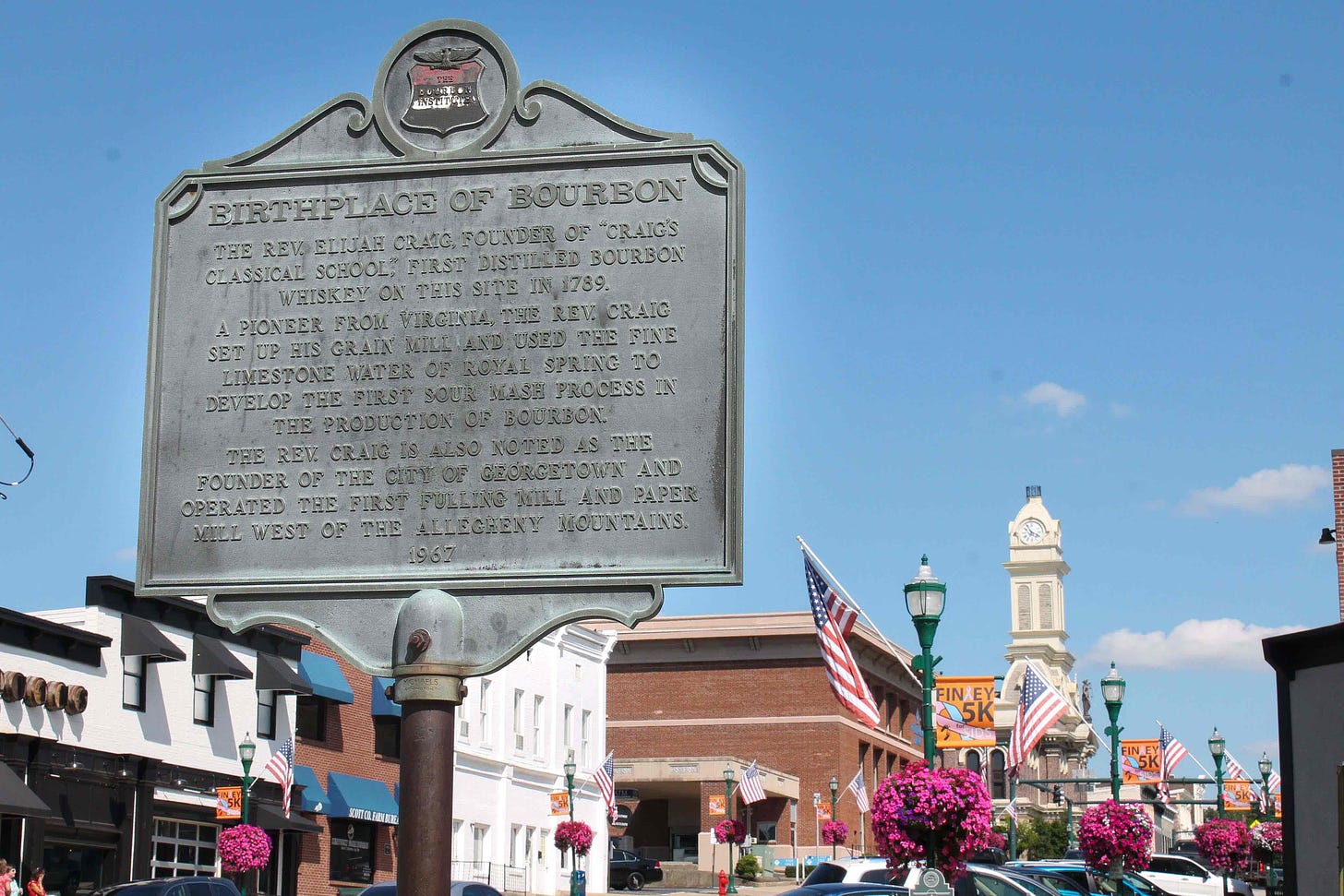November 8 - Beautiful Spirit: The Birth of Bourbon Whiskey
Maintaining Unwavering Integrity in Process and Purpose
This is the day Bourbon Whiskey was first distilled from corn by Elijah Craig in Bourbon, Kentucky in 1789.
In today's lesson, we will explore how one man's dedication to excellence in crafting something new teaches us about spiritual integrity. What can the careful process of creating bourbon whiskey teach us about maintaining faithfulness in our daily walk with God? How might paying attention to the small details of our faith journey impact our witness for Christ?
"Let your eyes look straight ahead; fix your gaze directly before you. Give careful thought to the paths for your feet and be steadfast in all your ways. Do not turn to the right or the left; keep your foot from evil." - Proverbs 4:25-27 (NIV)
This Date in History
On a brisk November morning in 1789, the air in Bourbon County, Kentucky, was filled with the sweet, pungent aroma of fermenting corn. In a modest wooden structure, Baptist minister Elijah Craig stood over a copper still, his brow furrowed in concentration. Little did he know that his experiment would give birth to a spirit that would become synonymous with American identity and craftsmanship: Bourbon whiskey.
Elijah Craig, born in 1738 in Orange County, Virginia, was a man of many talents. He was not only a Baptist preacher but also an educator, paper maker, rope maker, and an entrepreneur. Craig had moved to Kentucky in the 1780s, establishing a community that would later become Georgetown. His distilling endeavor was born out of both necessity and opportunity, as corn was abundant in the region and distilling provided a way to preserve and transport the crop's value.
Whiskey itself was not a new invention. For centuries, people had been distilling various grains into potent spirits. Scottish and Irish immigrants had brought their whiskey-making traditions to America, typically using rye as their primary grain. However, the abundance of corn in the Kentucky region presented both a challenge and an opportunity for early settlers like Craig.
Craig, a man of God and enterprise, saw potential in the golden kernels that flourished in the limestone-rich soil of Kentucky. His decision to use corn as the primary grain in his whiskey was a practical one, born of the need to preserve the value of the bountiful corn harvests.
The process Craig developed involved fermenting a mash of mostly corn, with smaller amounts of other grains like rye or barley, then distilling the mixture in copper stills. But it was what happened next that would set Bourbon apart from other whiskeys of the time.
Legend has it that Craig stored his newly distilled spirit in barrels that had been charred in a fire. Whether by accident or design, this decision would prove transformative. The science behind aging whiskey in charred oak barrels is complex but fascinating. The charring process caramelizes wood sugars and creates a layer of charcoal that acts as a natural filter. As the whiskey expands into the wood during hot weather and contracts during cold spells, it interacts with the compounds in the charred oak, picking up vanillins, spice notes, and a distinct amber color.
The result was a smooth, flavorful whiskey with a unique character – a spirit that would come to embody the rugged individualism of the American frontier. As news of Craig's creation spread, other distillers in the region began adopting his methods, refining and perfecting the process.
The name "Bourbon" comes from the county where Craig lived, which was named after the French royal family. At the time, Kentucky was still part of Virginia, and Bourbon County was much larger than it is today, encompassing numerous current Kentucky counties.
As Bourbon's popularity grew, it became a valuable trade commodity. Barrels of the amber liquid were floated down the Mississippi River to New Orleans, from where they were shipped to the East Coast and beyond. The spirit's journey down the river also contributed to its aging process, as the constant motion and temperature changes encouraged greater interaction between the whiskey and the barrel.
The impact of Craig's invention was far-reaching. Bourbon quickly gained popularity, becoming inextricably associated with Kentucky and helping to establish the state's reputation for fine whiskey. It became a symbol of American craftsmanship and ingenuity, appreciated not just at home but increasingly abroad. European royalty developed a taste for the distinctively American spirit, contributing to its prestige.
As the 19th century progressed, Bourbon's reputation continued to grow. It became a cultural ambassador, introducing the world to a uniquely American flavor. It influenced cocktail culture, inspired literature and music, and became deeply intertwined with the American narrative of frontier spirit and entrepreneurial drive.
Today, Kentucky produces 95% of the world's Bourbon, with the industry contributing billions to the state's economy annually. The legacy of Elijah Craig's pioneering spirit lives on in every barrel of Bourbon, each one a testament to the enduring power of American innovation and the transformative potential of a single, inspired idea.
Historical Context
Craig's innovation of Bourbon whiskey emerged during a pivotal period in American history. The late 18th century was a time of significant change and growth for the young United States. The Constitution had been ratified in 1788, just a year before Craig's breakthrough, establishing a new framework for governance and unity among the states.
The western frontier, including Kentucky, was a region of both opportunity and challenge. Settlers were pushing westward, seeking new lands and prospects. This expansion brought conflicts with Native American tribes and tensions with European powers who still held territories in North America. The frontier spirit of self-reliance and innovation that characterized this era was embodied in Craig's entrepreneurial ventures.
Economically, the United States was still finding its footing. Agriculture was the backbone of the economy, particularly in frontier regions like Kentucky. The abundance of corn in this area was a key factor in the development of Bourbon, as distilling provided a way to preserve and transport the value of crop surpluses.
The distilling industry itself was already an important part of the American economy. Whiskey was not just a beverage but also a form of currency on the frontier, where hard money was often scarce. This economic reality would soon lead to significant political conflict.
In 1791, just two years after Craig's creation of Bourbon, the newly formed federal government under President George Washington imposed an excise tax on distilled spirits. This tax, meant to help pay off Revolutionary War debts, disproportionately affected small-scale producers and led to the Whiskey Rebellion of 1791-1794. While this conflict primarily involved rye whiskey producers in western Pennsylvania, it highlighted the economic importance of whiskey production in the young nation and would indirectly impact the nascent Bourbon industry.
The international context is also crucial to understanding the era of Bourbon's birth. The French Revolution began in 1789, the same year as Craig's innovation, setting off a period of global upheaval that would last for decades. These international conflicts would both challenge and create opportunities for American trade, including the burgeoning whiskey industry.
Culturally, the United States was in the process of forging a distinct national identity. American-made products, including Bourbon, would play a role in this process, becoming symbols of national pride and craftsmanship.
The technological context of the time also played a role in Bourbon's development. The Industrial Revolution was in its early stages, bringing new manufacturing techniques and transportation methods that would eventually help Bourbon reach a wider market.
In this dynamic and often turbulent environment, Elijah Craig's creation of Bourbon whiskey stands as a testament to the innovation and adaptability that characterized the American frontier. It marked the beginning of a distinctly American contribution to the world of spirits, one that would grow to have significant economic, cultural, and even diplomatic impact in the centuries to come.
Did You Know?
Contrary to popular belief, Bourbon does not have to be made in Kentucky to be called Bourbon, though 95% of all Bourbon is produced there.
Today’s Reflection
On a November day in 1789, Elijah Craig, a Baptist minister with an entrepreneurial spirit, crafted something more than just a new type of whiskey. In his careful process of distilling bourbon, he demonstrated the value of unwavering integrity—a lesson as relevant to our spiritual lives as it was to his craft. Craig knew that every detail mattered, from selecting the finest ingredients to refining each step in his method. His dedication reminds us that just as he wouldn't compromise quality for convenience, we are called to a life of integrity in our walk with God, remaining true in both the small choices and the grand commitments.
Craig's process inspires us to ask ourselves: Are we faithful in the "distilling" of our own lives, ensuring our actions align with our faith? Just as Craig's unyielding standards created a legacy that endures, so does our commitment to integrity build a faith that's rich and lasting. This was the wisdom captured in Proverbs: "Let your eyes look straight ahead; fix your gaze directly before you. Give careful thought to the paths for your feet and be steadfast in all your ways" - Proverbs 4:25-27 (NIV). Integrity, at its core, means living in a way that is whole and consistent, honoring God even in the smallest details of our daily lives.
For Craig, integrity meant meticulously choosing the best grains, controlling the distillation with precision, and allowing the whiskey to age in charred oak barrels without rushing the process. Each of these steps had to be carefully upheld to achieve a superior product. Similarly, in our Christian walk, integrity means aligning our actions with our beliefs, remaining steadfast in commitment to God's principles in every aspect of life.
In our fast-paced world, we often feel tempted to take shortcuts or compromise our values for quick gains or comfort. Skipping prayer, bending the truth, or cutting corners might seem insignificant, but these small compromises erode the foundation of our faith over time. Just as these shortcuts would produce a substandard bourbon, they also weaken our witness and dilute our faith. Integrity invites us to embrace even the smallest choices as significant, knowing they contribute to the testimony of our lives.
Jesus emphasized this when He said, "All you need to say is simply 'Yes' or 'No'; anything beyond this comes from the evil one" - Matthew 5:37 (NIV). This call for straightforward honesty captures the heart of integrity—trustworthiness, reliability, and consistency in every facet of life.
Integrity isn't only about avoiding major moral failures; it's about being trustworthy in the small, everyday choices. As Luke reminds us, "Whoever can be trusted with very little can also be trusted with much" - Luke 16:10 (NIV). Every choice, no matter how small, reflects our commitment to God and to living a life that speaks of His truth.
Reflecting on Craig's legacy and Proverbs' call to integrity, consider your own life: are there areas where you've been tempted to take shortcuts? Are there choices, even small ones, that you can align more closely with your faith? Integrity is a daily commitment to God's principles, an ongoing refinement process where every decision matters.
Just as a fine bourbon reflects the careful, uncompromising process that shaped it, a life of faith marked by integrity produces a witness that endures. May we, like Elijah Craig, be known for our steadfast commitment to quality and authenticity in our walk with God, bearing the rich, lasting testimony of a life lived with integrity.
Practical Application
For the next 24 hours, pay careful attention to every instance where you might be tempted to tell a "small" lie or half-truth—whether to avoid conflict, make yourself look better, or simply make life easier. This might be saying "I'm fine" when you're not, making an excuse for being late, or exaggerating a story. Each time you catch yourself about to compromise the truth, pause and choose complete honesty, even if it's uncomfortable. Note how this heightened awareness of integrity in your words affects your other choices throughout the day and your overall witness for Christ.
Closing Prayer
Heavenly Father, thank You for the example of those who have gone before us, showing us the value of integrity in all things. Help us to be faithful in both the significant moments and the small daily choices of our lives. Give us the strength to resist shortcuts and compromises, keeping our eyes fixed straight ahead on the path You have set before us. May our lives be refined by Your Spirit, producing a lasting testimony to Your transforming grace. In Jesus' name, Amen.
Supplementary Study
"Lord, who may dwell in your sacred tent? Who may live on your holy mountain? The one whose walk is blameless, who does what is righteous, speaks the truth from their heart."
This passage emphasizes that integrity is not just about outward actions but about an inner commitment to truth and righteousness, much like the internal quality that makes a well-crafted spirit.
"But Daniel resolved not to defile himself with the royal food and wine, and he asked the chief official for permission not to defile himself this way."
Daniel's unwavering commitment to his principles, even in small matters of diet, demonstrates how integrity in seemingly minor decisions can have major impact.
"Whatever you do, work at it with all your heart, as working for the Lord, not for human masters."
This verse reminds us that maintaining integrity in our work and daily tasks is an act of worship, just as Craig's careful attention to his craft became a testament to excellence.
Final Thoughts
Integrity shapes not only who we are but what we leave behind. Elijah Craig's commitment to excellence created a legacy that endures centuries later, not just in the bourbon he pioneered, but in the example he set of unwavering dedication to doing things right. As followers of Christ, our integrity in both major decisions and minor details crafts a testimony that impacts generations to come. When we resist the temptation to compromise, choosing instead to remain faithful in all things, we create something far more valuable than any earthly product – a life that clearly reflects the transforming power of God.
Community Engagement
Share your thoughts or use these questions to get the conversation started.
What surprises you most about Elijah Craig's role in creating bourbon whiskey?
In what areas of your life do you find it most challenging to maintain integrity?
How might viewing your daily tasks as opportunities for spiritual faithfulness change your approach to them?
What role do you think the "small compromises" play in weakening our Christian witness?
This devotional is free to read. You can support this publication by becoming a subscriber, upgrading to paid subscriber status, liking (❤️) this post, commenting, and/or sharing this post with anyone who might enjoy it.
In tomorrow's lesson, we'll encounter a remarkable individual whose life exemplifies the transformative power of persisting in one's calling, even in the face of discouragement and rejection. Prepare to be uplifted and inspired as we explore the life of an extraordinary figure whose unwavering dedication to her craft and convictions left an indelible mark on history.
Bonus - Did You Know?
Elijah Craig was known as "The Pope of the Kentucky Baptists" due to his influential role in establishing Baptist churches throughout the region.
The charred oak barrel aging process, crucial to Bourbon's flavor, may have been discovered accidentally when Craig used a barrel that had been scorched in a fire.
Bourbon County, Kentucky, was named after the French House of Bourbon as a gesture of gratitude for France's assistance during the American Revolution.
During Prohibition (1920-1933), Bourbon was one of the few spirits that could be legally prescribed by doctors for medicinal purposes.
The term "Bourbon" wasn't widely used to describe the whiskey until the 1870s, nearly a century after Craig's invention.
Bourbon barrels can only be used once for aging Bourbon, but they are often repurposed for aging other spirits like Scotch, rum, and tequila.
Additional Resources
Bourbon: The Rise, Fall, and Rebirth of an American Whiskey - Fred Minnick
Bourbon Empire: The Past and Future of America's Whiskey - Reid Mitenbuler
Kentucky Bourbon Whiskey: An American Heritage - Michael R. Veach
Bourbon: A History of the American Spirit - Dane Huckelbridge











Interesting that he created Bourbon, but it was only referred as that long after he was gone. Quite a legacy though. Enduring craftsmanship and legacy are often synonymous. And a good lesson for us, in keeping one's integrity. There's a couple of things from this week I should have been as careful.
The bourbon is quality. The story is even better!